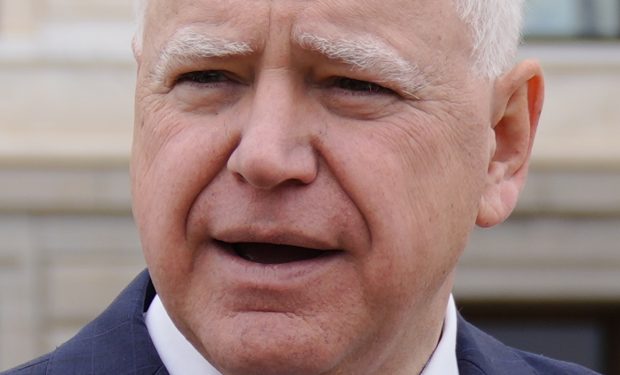Democratic Vice Presidential nominee Tim Walz has hit the campaign trail running as “America’s Dad,” a moniker that evokes a genial man drinking a root beer at a Midwestern picnic Charles Schulz might draw, happily coming in second in horseshoes while his daughter rolls her eyes (affectionately) at the shirt he’s chosen that day. This is a portrait Democrats are fond of.
GOP presidential nominee Donald Trump, on the other hand, portrays Walz as a radical freak, so far to the left that if the world were flat, he might fall off.
Addressing the Walz and Kamala Harris ticket, Trump said last week: “If Comrade Walz and Comrade Harris win this November, the people cheering will be the pink-haired Marxists, the looters, the perverts, the flag burners, Hamas supporters, drug dealers, gun grabbers and human traffickers.”
Trump’s rhetoric, as shown above, tends toward the dark and threatening — “if Harris wins, we won’t have a country anymore” he’s said — whereas Walz tends toward the positive. The Democrats are betting that more Americans will embrace a can-do attitude — that optimism will beat fear at the ballot box.
Gov. @Tim_Walz: Donald Trump and JD Vance see the least fortunate among us as a scapegoat. Kamala Harris and Democrats see them as our neighbors. That’s a big difference pic.twitter.com/Ziu6qRmzS8
— Kamala HQ (@KamalaHQ) August 11, 2024
Trying to explain the difference between the Trump-Vance dark vision (“American carnage”) and the Harris-Walz brighter vision for the future in the segment above, Walz makes the case that in this respect, the new Democratic ticket is much like the former Democratic ticket.
Walz even finds himself leaning on the words of President Joe Biden to back his notion of American capacity and enterprise. “Joe Biden said this,” Walz said, “when America decides to tackle big things, I would never bet against us.”
Walz also said: “[Donald Trump and JD Vance] see the least fortunate among us as scapegoats and punchlines for them. Kamala Harris and Democrats see them as our neighbors. That’s a big difference.”
[NOTE: The difference in tone is not a partisan take, but a matter of clearly defined rhetorical style and strategy: The Trump campaign emphasizes calamity and doom and the Harris campaign emphasizes hope.]
Walz addressed the idea of good neighbors last week also, trying to make a distinction between what he characterizes as a less intrusive Democratic Party versus a Republican Party that wants to legislate into traditionally private realms. “In Minnesota,” Walz said, “we respect our neighbors and their personal choices that they make, even if we wouldn’t make the same choice for ourselves. There’s a golden rule — mind your own damn business.”
